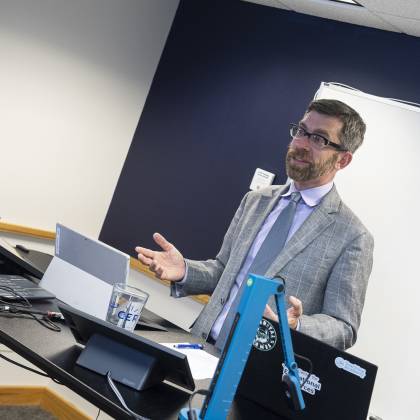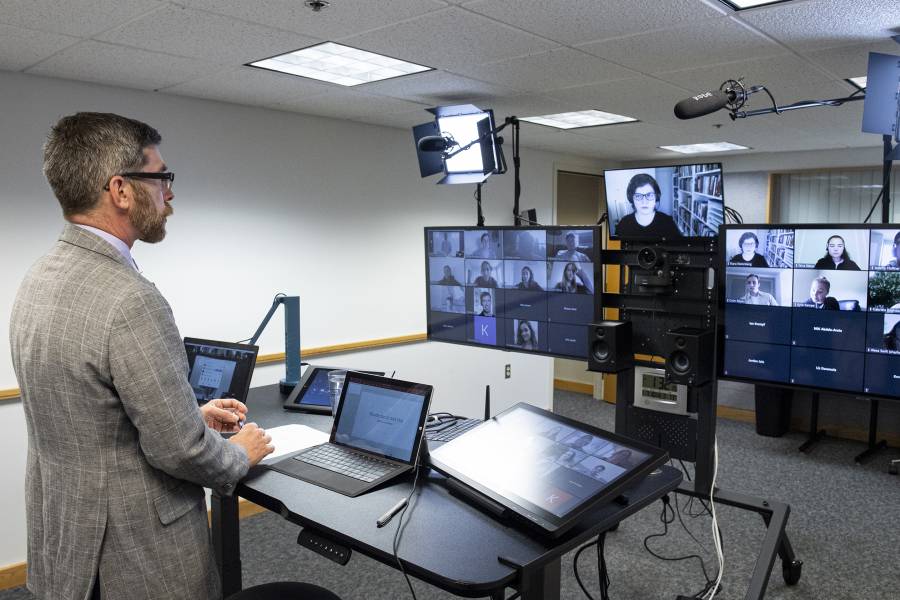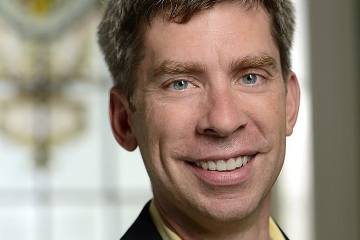At last we know: what made possible the March 2020 pandemic pivot to remote teaching was… the Force.
"I've noticed over the years that all of you folks at [the Center for Educational Resources] are like Jedis—you have a superhuman ability to explain things more parsimoniously and elegantly than ordinary mortals. Everyone is freaking out now, and you've been the calm in the storm (or at least that's how it looks on the outside)," wrote Ryan Calder, assistant professor in the Department of Sociology, in a 2020 email to the center's director, Mike Reese.
The center, which has provided instructional resources and support to faculty, graduate students, postdoctoral fellows, and staff since 2000, has taken on so many new roles over the years that it's changing its name to better reflect its expanded mission. It will now be known as the Center for Teaching Excellence and Innovation, or CTEI.
"The name change is driven by our services evolving significantly since our founding," Reese says. "We wanted a name that doesn't just speak to us as a place you come to learn about educational resources, but as a place that is trying to drive and support teaching innovation, and raising us to the highest level of instructional excellence."
As the university implements recommendations of CUE2, the Second Commission on Undergraduate Education, the center will take on additional responsibilities as faculty and students develop new ways to engage with one another and pursue new educational outcomes. Beginning this fall, for example, all first-year students will be required to take a first-year seminar. With just 15 students in each, there will need to be about 100 seminars to accommodate them, which requires leveraging Hopkins' professional schools. The center has been helping to assess the early pilots to support Aliza Watters, assistant dean for undergraduate curriculum, in scaling up the program next year.

Image caption: Mike Reese leads a training on remote instruction in fall 2020. Before the pandemic, the center typically conducted roughly 1,700 consultations with faculty on educational technology and techniques each year. Last year, that figure was more than 6,000.
Image credit: Will Kirk / Johns Hopkins University
The center's bread and butter has long been its consultative role, and that will continue. The numbers of consultations spiked during the shift to remote teaching and have not retreated since, says Reese, who is also associate teaching professor in the Department of Sociology. Before the pandemic, center staff held some 1,700 consultations with faculty on pedagogical strategies, educational technology, and program assessment each year. Last year, that figure was more than 6,000, and remains on a similar track for this year.
At the same time, demand for trainings has increased, and the center now holds double the number of workshops it used to. Its university-wide Teaching Academy prepares graduate students and post-docs for future teaching responsibilities, and its Best Practices in University Teaching workshop, also university-wide, focuses on the basics of course design and evidence-based teaching practices.
In addition, the center will continue its education research partnerships with faculty and graduate students, as well as its instructional equipment training and loan program. It also assists faculty and graduate students with grants for training, program assessment, and instructional innovation, and holds events for the community to talk about teaching—such as its Lunch and Learn conversations and Book Talk series—and national symposia to share best practices developed by faculty and center staff.
Reese has also seen the center take an increasingly large role in convening and connecting. Since its staff work with so many people and organizations across Hopkins, it is well-positioned to link entities working on similar issues or developing similar interests, he says. The term "center" has deeper meaning here: "We really see ourselves at the center of a number of interconnected relationships to help facilitate the sharing of ideas and connecting people, and we take that role very seriously," Reese says.
While the center will move from the Sheridan Libraries to the Krieger School of Arts and Sciences on July 1, its convening role will remain at the heart of its future activities and will likely expand. CUE2 brings new opportunities for teaching faculty across Hopkins to collaborate in undergraduate education. More symposia will showcase what Hopkins faculty have learned and give them a chance to share with one another and with peers at other institutions. New opportunities will bring together the many faculty members who have expressed interest in incorporating into their regular pedagogy some of the instructional innovations they made during remote teaching. And Reese sees an increasing need for, and interest in, community-based learning—where the university not only serves community members but also learns from them—so center staff work regularly with the Center for Social Concern.
"We're now providing more than basic-level support, but also driving instructional innovation and helping faculty achieve what they want in terms of their own vision of teaching in the classroom or developing new curricula," Reese says.
Posted in University News, Student Life
Tagged university news, center for educational resources, academic support










